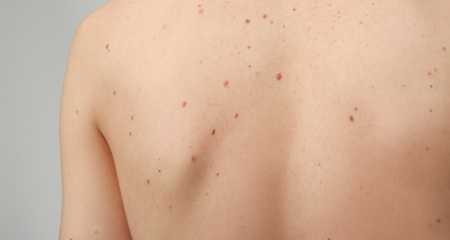
People usually don’t pay much attention to their moles unless they’re on the face or another noticeable area. However, keeping track of moles is critical since these spots can occasionally develop into melanoma, a serious type of skin cancer. At Northstar Dermatology, our board-certified dermatologists perform full-body skin exams, closely inspecting any moles that appear unusual. Whether you’re considering a cosmetic removal or feel concerned about a mole’s appearance, schedule an appointment with us today.
A mole is a small cluster of pigment-producing cells, called melanocytes, that form visible spots or growths on the skin. These growths are very common—most people have them—and their color can vary from your skin tone to shades of pink, blue, brown, or even black. Moles usually first appear during childhood and may grow throughout adolescence. Getting moles as an adult could signal you’re at risk for melanoma, so it’s imperative to have them examined by a board-certified dermatologist.
If your mole displays any of the traits on this list, make an appointment for a head-to-toe skin cancer screening at our office.
If a mole shows signs of irregularity or potential skin cancer during an exam, a biopsy may be the next step. This procedure starts with the area in question being numbed, and a small portion of the mole is carefully shaved using a fine blade to collect a tissue sample. The sample is then sent to a pathology lab, where it’s analyzed in detail to identify any abnormalities. If skin cancer is detected, your dermatologist may suggest additional treatment or excision to fully remove any remaining cancerous cells. Other questionable moles may also be excised or closely monitored at your doctor’s discretion.
Board-certified dermatologists are highly skilled at identifying atypical moles and often use a specialized dermatoscope to better view your skin’s unique characteristics. If you’re concerned about any new or changing moles, get in touch with the specialists at Northstar Dermatology today.
